- Home
- Eoin Colfer
The Time Paradox Page 18
The Time Paradox Read online
Page 18
He steepled his fingers, allowing the moment to build, then began his presentation.
“Every year we put a rare animal on trial.”
There were a few hoots from the audience, which Kronski waved away good-naturedly.
“A real trial, where the host prosecutes, and one of you lucky people gets to defend. The idea is simplicity. If you can convince a jury of your unprejudiced peers . . .”
More hooting.
“. . . that the creature in this cage contributes positively to human existence on this planet, then we will free the creature, which, believe it or not, did happen once in 1983. A little before my time, but I am assured that it actually happened. If the defense counsel’s peers are not convinced of the animal’s usefulness, then I press this button.” And here, Kronski’s bulbous fingers twiddled playfully with an oversize red button on his remote control. And the animal drops from its cage into the pit, passing the laser eye beam, which activates the gas-powered flame jets. Voilà, instant cremation.
“Allow me to demonstrate. Indulge me; it’s a new pit. I’ve been testing it all week.”
He nodded at one of the staff, who yanked up a section of the grid with a steel hook. Kronski then picked a melon from a fruit platter and tossed it into the pit. There was a beep followed by an eruption of blue-white flame gouts from nozzles ranged around the pit walls. The melon was burned to black floating crisps.
The display drew an impressed round of applause, but not everyone appreciated Kronski’s grandstanding.
Jeffrey Coontz-Meyers cupped both hands around his mouth. “Come on, Damon. What have we got tonight?
Not another monkey. Every year it’s monkeys.”
Generally interruptions would irritate Kronski, but not tonight. On this night all hectoring, however witty, would be swept from people’s memories the second that curtain was drawn aside.
“No, Jeffrey, not another monkey. What if—”
Jeffrey Coontz-Meyers groaned vocally. “Please, no more what if’s. We had half a dozen with the fish. Show us the blasted creature.”
Kronski bowed. “As you wish.”
He thumbed a button on his remote control, and a large view screen descended from the rafters, covering the back wall. Another button pushed, and the curtain concealing the caged creature swished smoothly to one side.
Holly was revealed, cuffed to the baby chair, her eyes darting and furious.
At first the main reaction was puzzlement.
Is it a little girl?
It’s just a child.
Has Kronski gone mad? I knew he sang to himself, but this?
Then the Extinctionists’ eyes were drawn to the screen, which was displaying a feed from a camera clamped to the cage.
Oh my lord. Her ears. Look at her ears.
She’s not human.
What is that? What is it?
Tommy Kirkenhazard stood. “This’d better not be a hoax, Damon. Or we’ll string you up.”
“Two points,” said Kronski softly. “First, this is no hoax. I have unearthed an undiscovered species; as a matter of fact, I believe it to be a fairy. Second, if this was a hoax, you would not be stringing anyone up, Kirkenhazard. My men would cut you down before you could wave that ridiculous hat of yours and shout ‘Yee-haw.’”
Sometimes it was good to send a shiver down people’s spines. Remind them where the power was.
“Of course, your skepticism is to be expected, welcomed, in fact. To put your minds at rest, I will need a volunteer from the audience. How about you, Tommy? How’s that backbone of yours?”
Tommy Kirkenhazard gulped down half a glass of whiskey to bolster his nerves, then made his way to the cage.
Good performance, Tommy, thought Kronski. It’s almost as if we hadn’t arranged this little confrontation to give me a bit more credibility.
Kirkenhazard stood as close to Holly as he dared, then reached in slowly to tweak her ear.
“My saints, it’s no fake. This is the real deal.” He stood back, and the truth of what was happening filled his face with joy. “We got ourselves a fairy.”
Kirkenhazard rushed across to Kronski’s podium and pumped his hand, clapping his back.
And so my biggest critic is converted. The rest will follow like sheep. Useful animals, sheep.
Kronski silently congratulated himself.
“I will prosecute the fairy, as is the tradition,” Kronski told the crowd. “But who will defend? What unlucky member will draw the black ball. Who will it be?”
Kronski nodded at the maître d’.
“Bring the bag.”
Like many ancient organizations, the Extinctionists were bound by tradition, and one of these traditions was that the creature on trial could be defended by any member of the assembly, and if no member was willing, one would be chosen by lottery. A bag of white balls, with one black. The spherical equivalent of the short straw.
“No need for the bag,” said a voice. “I will defend the creature.”
Heads turned to locate the speaker. It was a slender young man with a goatee and piercing blue eyes. He was wearing tinted glasses and a lightweight linen suit.
Kronski had noticed him earlier, but could not put a name to the face, which disturbed him.
“And you are?” he asked, while swiveling his laptop so that the built-in camera was aimed at this stranger.
The young man smiled. “Why don’t we give your identification software a moment to whisper the answer to you.”
Kronski thumbed ENTER, the computer captured an image, and five seconds later it plucked membership details from the Extinctionists’ file.
Malachy Pasteur. Young French-Irish heir to an abattoir empire. Made a sizeable donation to the Extinctionists’coffers. His first conference. As with all attendees, Pasteur was thoroughly vetted before his invitation was issued. A valuable addition to the ranks.
Kronski was all charm.
“Mr. Pasteur. We are delighted to welcome you to Morocco. But tell me, why would you wish to defend this creature? Her fate is almost certainly sealed.”
The young man walked briskly to the podium. “I enjoy a challenge. It is a mental exercise.”
“Defending vermin is an exercise?”
“Especially vermin,” retorted Pasteur, lifting the lid on his laptop. “It is easy to defend a servile, useful animal like the common cow. But this? This will be a hard-fought battle.”
“A pity to be crushed in battle so young,” said Kronski, his lower lip hanging with mock sympathy.
Pasteur drummed his fingers on the podium. “I have always liked your style, Dr. Kronski. Your commitment to the ideals of Extinctionism. For years I have followed your career, since I was a boy in Dublin, in fact. Lately, however, I feel that the organization has lost its way, and I am not the only one with this feeling.”
Kronski ground his teeth. So that was it. A naked challenge to his leadership.
“Be careful what you say, Pasteur. You tread on dangerous ground.”
Pasteur glanced at the floor below him where ice water still sloshed in the pit beneath. “You mean I could sleep with the fishes? You would kill me, Doctor? A mere boy? I don’t think that would bolster your credibility much.”
He’s right, fumed Kronski. I can’t kill him. I must win this trial.
The doctor forced his mouth to smile. “I don’t kill humans,” he said. “Just animals. Like the animal in this cage.”
Kronski’s many supporters applauded, but that still left many silent.
I was wrong to come here, Kronski realized. It is too remote. Nowhere for private jets to land. Next year I will find somewhere in Europe. I will announce the move as soon as I crush this whelp.
“Allow me to explain the rules,” continued Kronski, thinking, Explaining the rules puts me in charge and gives me the upper hand, psychologically speaking.
“No need,” said Pasteur brusquely. “I have read several transcripts. The prosecutor puts his case, the defender puts his cas
e. A few minutes of lively debate, then each table votes. Simple. Can we please proceed, Doctor. No one here appreciates their time being wasted.”
Clever, young man. Putting yourself on the same side as the jury. No matter. I know these people, and they will never acquit a beast, no matter how pretty she is.
“Very well. We shall proceed.” He selected a document on his desktop. His opening statement. Kronski knew it by heart, but it was comforting to have the words easily accessible.
“People say that we Extinctionists hate animals,” began Kronski. “But this is not the case. We do not hate poor dumb animals; rather, we love humans. We love humans and will do whatever it takes to ensure that we, as a race, survive for as long as possible. This planet has limited resources, and I, for one, say we should hoard them for ourselves. Why should humans starve when dumb animals grow fat? Why should humans freeze when beasts lie toasty warm in their coats of fur?”
Malachy Pasteur made a noise somewhere between a cough and a chuckle. “Really, Dr. Kronski, I have read several variations on this speech. Every year, it seems, you trot out the same simplistic arguments. Can we please focus on the creature before us tonight?”
A tittering ripple spread among the banquet guests, and Kronski had to struggle to contain his temper. It seemed he had a battle on his hands. Very well, then.
“Most amusing, boy. I was going to take it easy on you, but now the gloves are off.”
“We are delighted to hear it.”
We? We?
Pasteur was swinging the Extinctionists his way without their even knowing it.
Kronski summoned every last drop of charisma from inside himself, flashing back to his youth, to those long summer days spent watching his evangelist daddy whip up the crowds inside a canvas tent.
He raised his arms high, each finger bent back until the tendons strained.
“This is not what we are about, people,” he thundered. “We did not travel all this way for some petty verbal sparring. This is what the Extinctionists are about.” Kronski pointed a rigid finger at Holly. “Ridding our planet of creatures like this.”
Kronski shot a sideways glance at Pasteur, who was leaning chin on hands, a bemused look on his face. Standard opposition behavior.
“We have a new species here, friends. A dangerous species. It can make itself invisible, it can hypnotize through speech. It was armed.”
And to much oohing from the crowd, Kronski drew forth Holly’s Neutrino handgun from his pocket.
“Do any of us wish to face a future where this could be pointed in our faces? Do we? The answer, I think, is clearly no. Now, I’m not going to pretend that this is the last one of its kind. I feel certain that there are thousands of these fairies, or aliens, or whatever, all around us. But does that mean we should grovel and release this little creature? I say no. I say we send a message. Execute one, and the rest will know we mean business. The governments of the world despise us now, but tomorrow they will come banging down our door for guidance.”
Time for the big finish. “We are Extinctionists, and our time is now!”
It was a good speech and drew wave after wave of applause, which Pasteur rode out with the same bemused expression.
Kronski accepted the applause with a boxer’s rolling of the shoulders, then nodded toward the opposite podium.
“The floor is yours, boy.”
Pasteur straightened and cleared his throat . . .
. . . Artemis straightened and cleared his throat. The fake beard glued to his chin itched like crazy, but he resisted the impulse to scratch it. In a fair arena he would destroy Kronski’s arguments in about five seconds, but this was not a fair arena, or even a sane one. These people were bloodthirsty, jaded billionaires, using their money to buy illicit excitement. Murder was just another service that could be purchased. He needed to handle this crowd carefully. Push the right buttons. First of all he had to establish himself as one of them.
“When I was young, and the family wintered in South Africa, my grandfather would tell me stories of a time when people had the right attitude toward animals. ‘We kill ’em when it suits us,’ he said to me. ‘When it serves our purposes.’ This is what the Extinctionists used to be about. A species was not protected unless we humans benefited from its survival. We kill when it benefits us. If an animal is using the planet’s resources and not directly contributing to our health, safety, and comfort, we wipe it out. Simple as that. This was an ideal worth fighting for. Worth killing for. But this . . .” Artemis pointed at the pit below him and Holly in her cage. “This is a circus. This is an insult to the memory of our ancestors who gave their time and gold to the Extinctionists’ cause.”
Artemis worked hard on his eye contact, connecting with as many people as possible in the audience, lingering for a moment with each one.
“We have an opportunity to learn from this creature. We owe it to our predecessors to find out if she can contribute to our coffers. If this is, in reality, a fairy, then who knows what magic it possesses? Magic that could be yours. If we kill this fairy, we will never know what unimaginable wealth dies with it.”
Artemis bowed. He had made his point. It would not be enough to sway the bloodthirsty Extinctionists, he knew, but it might be enough to make Kronski feel a little less cocky.
The doctor was waving his hands before the echo of Artemis’s voice had faded.
“How many times must we listen to this argument?” he wondered. “Master Pasteur accuses me of repeating myself, while he repeats the tired argument of every defense counsel we have ever listened to.” Kronski tapped his lips in horror. “Ooh, let us not kill the creature, for it is potentially the source of all our power and wealth. I remember spending a fortune on a sea slug that was supposed to cure arthritis. All we got was very expensive goo. This is all supposition.”
“But this creature is magical,” objected Artemis, banging the podium with his fist. “We have all heard how she can turn invisible. Even now her mouth is taped so she cannot hypnotize us. Imagine the power we could wield if we were to unlock the secrets of these gifts. If nothing else, they would better prepare us to deal with the rest of her kind.”
Kronski’s main problem was that he agreed with much of his opposition’s argument. It made perfect sense to save the creature and tease her secrets from her, but he could not afford to lose this argument. If he did, he might as well hand over the leadership.
“We have tried to interrogate her. Our best men tried, and she told us nothing.”
“It is difficult to talk with a taped mouth,” Artemis noted drily.
Kronski drew himself to his full height, lowering the timbre of his voice for effect. “The human race faces its most deadly enemy, and you want to cozy up to it. That is not how we Extinctionists do things. If there is a threat, we wipe it out. That is how it has always been.”
This brought a roar of approval from the crowd; bloodlust trumps logic every time. Several members were on their feet, hollering. They’d had enough of the argument and wanted some action.
Kronski’s face was flushed with victory.
He thinks it’s over, thought Artemis. Poor man. And then: This beard really itches.
He waited calmly until the furor had trailed away, then came out from behind the podium. “I was hoping to spare you this, Doctor,” he said. “Because I respect you so much.”
Kronski flapped his lips. “Spare me what, Master Pasteur?”
“You know what. I think you have pulled the wool over everyone’s eyes long enough.”
Kronski was not in the least worried. The boy was beaten and everything else was was just irritating chatter. Still, why not let Pasteur dig a hole for himself?
“And what wool would that be?”
“Are you certain you want me to continue?”
Kronski’s teeth glittered when he smiled. “Oh, absolutely certain.”
“As you wish,” said Artemis, approaching the dock. “This creature was not our original defendan
t. Up until yesterday we had a lemur. Not quite a monkey, Mr. Coontz-Meyers, but close enough. I say we had a lemur, but in truth we almost had a lemur. It went missing at the pickup. Then, and this is important, then we were sold this creature by the same boy who sold us the lemur, undoubtedly paid for from Extinctionists’ funds. Does anyone else think this is a little off? I do. This boy keeps his lemur and sells us a supposed fairy.”
Kronski was not so cocky now. This Pasteur fellow had a lot of information.
“Supposed fairy?”
“That’s right. Supposed. We have only your word for it, and of course that of Mr. Kirkenhazard, who apparently is your worst enemy. Nobody is falling for that ruse, I assure you.”
“Examine the thing yourself,” blurted Kronski, glossing over the Kirkenhazard accusation. “This is an easy argument to win.”
“Thank you, Doctor,” said Artemis. “I believe I shall.”
Artemis approached the cage. This was the tricky part, as it required sleight of hand and coordination, which were the elements in every plan that he usually left to Butler.
His pocket bulged slightly with a couple of adhesive nu-skin bandages taken from Mulch’s medi-kit. He had told the security guard that they were nicotine patches and so had been allowed to bring them through to the banquet. The bandage adhesive was activated by skin contact, and it molded itself to the contours it was applied to, assuming the color and texture of the surrounding skin.
Artemis’s fingers hovered over his pocket, but it was not yet time to touch a bandage. It would simply stick to his own hand. Instead he reached into his other pocket for the phone he had stolen from the Bentley, back at Rathdown Park.
“This phone is invaluable to me,” he told the Extinctionists. “It’s a little bulkier than other phones, but that is because I have been installing add-ons for years. This phone is an amazing thing, really. I can stream television, watch movies, check my stocks, all the standard stuff. But I also have an X-ray camera and display. Just give me a second.” Artemis pressed a few buttons, linking the phone by Bluetooth to the laptops, and from there to the large view screen.
“Ah, here we are,” Artemis said, passing the phone in front of his hand. On screen an arrangement of phalanges, metacarpals, and carpals stood out darkly inside a pale foam of flesh. “You see the bones of my hand quite clearly. This is a very good projection system you have, Dr. Kronski. I congratulate you.”

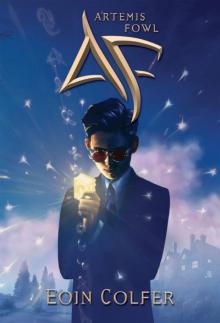 Artemis Fowl
Artemis Fowl Plugged
Plugged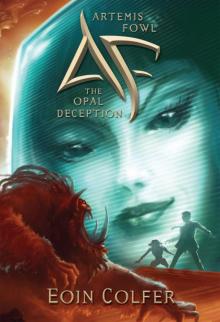 The Opal Deception
The Opal Deception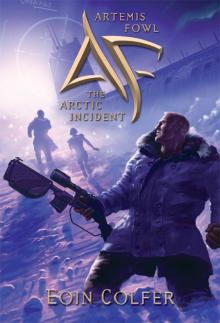 The Arctic Incident
The Arctic Incident The Wish List
The Wish List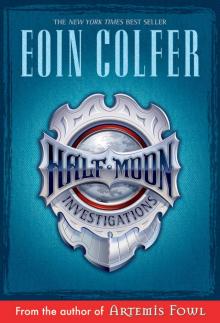 Novel - Half Moon Investigations
Novel - Half Moon Investigations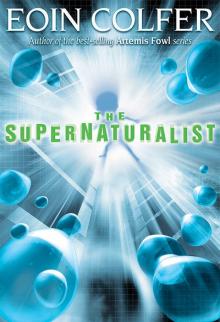 The Supernaturalist
The Supernaturalist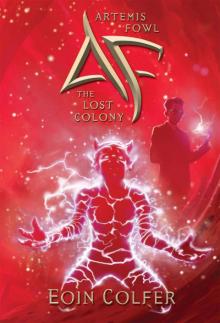 The Lost Colony
The Lost Colony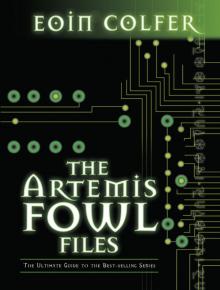 The Artemis Fowl Files
The Artemis Fowl Files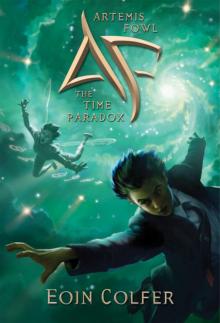 The Time Paradox
The Time Paradox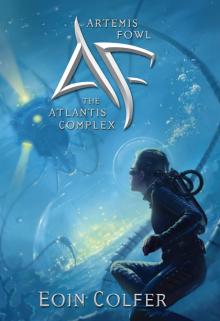 The Atlantis Complex
The Atlantis Complex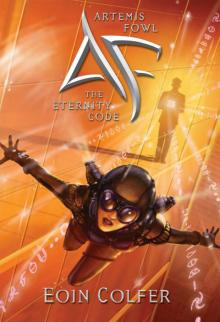 The Eternity Code
The Eternity Code The Time Paradox (Disney)
The Time Paradox (Disney)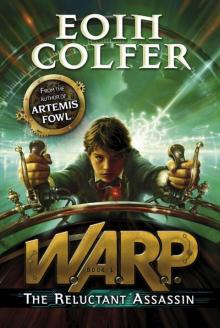 The Reluctant Assassin
The Reluctant Assassin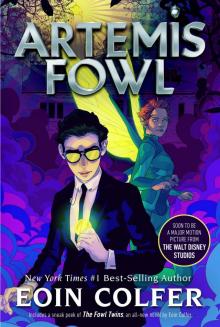 Artemis Fowl (Disney)
Artemis Fowl (Disney) Highfire
Highfire The Last Guardian
The Last Guardian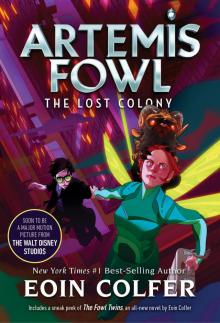 The Lost Colony (Disney)
The Lost Colony (Disney)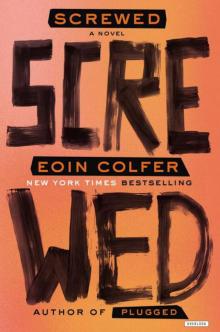 Screwed: A Novel
Screwed: A Novel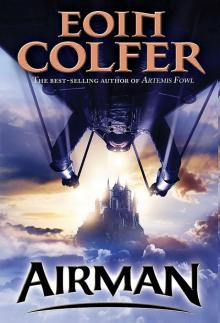 Novel - Airman
Novel - Airman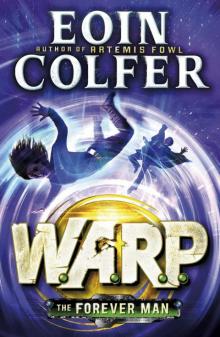 The Forever Man
The Forever Man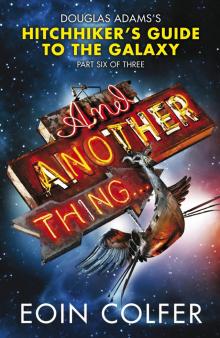 And Another Thing...
And Another Thing...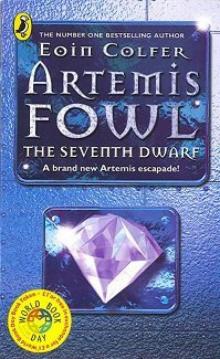 The Seventh Dwarf
The Seventh Dwarf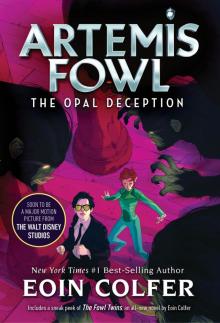 The Opal Deception (Disney)
The Opal Deception (Disney)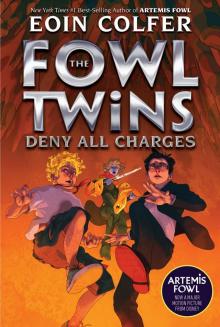 The Fowl Twins Deny All Charges
The Fowl Twins Deny All Charges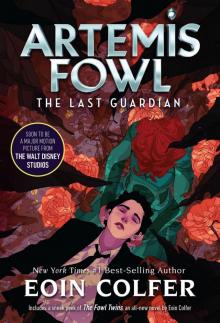 The Last Guardian (Disney)
The Last Guardian (Disney) The Hangman's Revolution
The Hangman's Revolution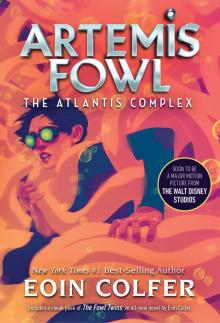 The Atlantis Complex (Disney)
The Atlantis Complex (Disney)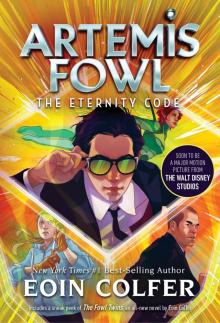 The Eternity Code (Disney)
The Eternity Code (Disney)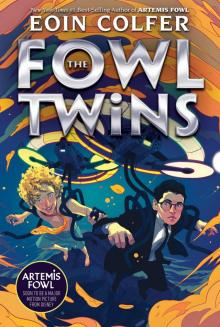 The Fowl Twins
The Fowl Twins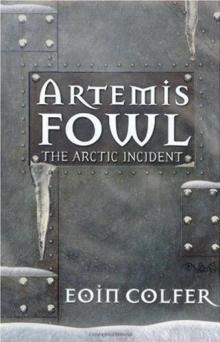 Artemis Fowl. The Arctic Incident af-2
Artemis Fowl. The Arctic Incident af-2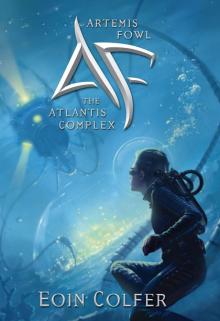 Artemis Fowl and the Atlantis Complex af-7
Artemis Fowl and the Atlantis Complex af-7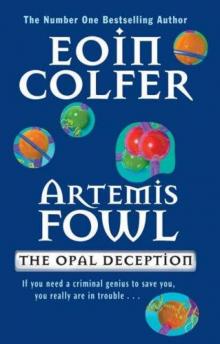 Artemis Fowl. The Opal Deception af-4
Artemis Fowl. The Opal Deception af-4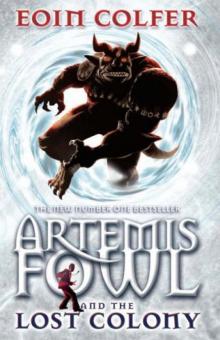 Artemis Fowl. The Lost Colony af-5
Artemis Fowl. The Lost Colony af-5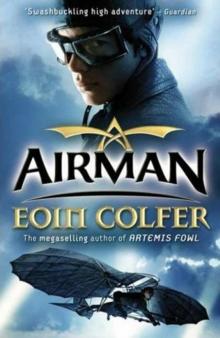 Airman
Airman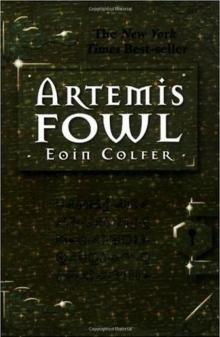 Artemis Fowl af-1
Artemis Fowl af-1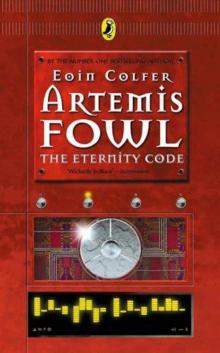 Artemis Fowl: The Eternity Code af-3
Artemis Fowl: The Eternity Code af-3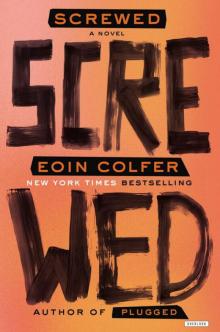 Screwed dm-2
Screwed dm-2